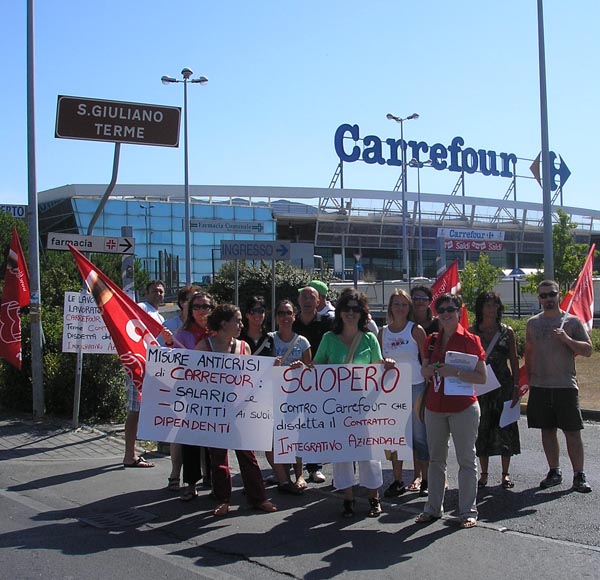Carrefour under pressure

|
|
The countrywide strikes organised by the Italian unions Filcams-CGIL, Fisascat-CISL and Uiltucs-UIL on July 17 and 18 to protest against Carrefour’s non-respect of the company’s collective agreement and the job losses associated with the upcoming store closures has led to increased pressure being put on Carrefour Italy. The decisions taken are inacceptable to the unions which, just a few months ago at the end of June, signed a national social pact with retail sector employers. This pact states that the effects of the economic crisis on employment should be anticipated and kept within bounds, by influencing work organisation. In a communiqué issued by Filcams, the union stated: “By referring the issue to UNI, it was our intention to open up a European-level dialogue and debate. With the company having developed a multinational restructuring programme to face up to the crisis, we need to find an overall solution providing job guarantees and job protection for all employees.” The multinational retail giant Carrefour, with its 15,000 company-run or franchise stores in 33 countries and its 495,000 employees, and with 72% of its turnover coming from France, Belgium, Italy and Spain, is finding it increasingly difficult to meet up to competition from other companies. On July 3, UNI Europa met with the trade unions from these four countries, just a few days after Carrefour CEO Lars Olofsson announced a strategic programme for transforming Carrefour, with the aim of winning over investors. The programme, though not explicitly referring to jobs, raises a number of question marks for trade unions who see in it the risk of major restructuring if short-term targets are not met. In Belgium, the company regularly hits the headlines. It has just lost its traditional number one position in the retail market to the discounter Colruyt. The Belgian unions affiliated to UNI Europa, with massive support from their members during a long month of collective action, had one of their toughest fights last autumn, when Carrefour attempted, just as in Italy, to undermine the collective agreement, though in that case by attempting legal arrangements. Much to its distaste, the company is losing one court case after another according to the unions. Elsewhere, UNI europa affiliated union in Poland, Solidarnosc, is criticising the lack of dialogue with union representatives on the closure or sale of at least 23 stores in the next few weeks. In a number of countries, as in Spain where up to now there have been no outright redundancies, temporary workers and employees on fixed-term contracts are becoming the first victims of closures and the scaling-down of operations, with their jobs not being replaced. Thousands of people are affected. UNI is of course putting a question mark over the worldwide direction the group is taking in these issues. In the face of such structural difficulties, the restructuring going on in the industry and the economic crisis, UNI remains open to dialogue with the multinational. Solutions can and must be found quickly. UNI has in the past proved itself to be a worthwhile dialogue partner. But dialogue is based above all on mutual confidence. And the pre-requisite for this, from a union point of view, is the respect of workers’ individual and collective rights. |


